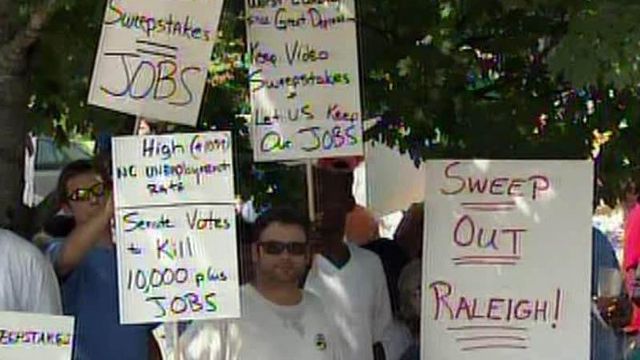Players, workers rally to halt sweepstakes gaming ban
Less than 48 hours after the state Senate overwhelmingly approved a ban on so-called sweepstakes cafes, scores of employees and customers of the online gaming parlors rallied Wednesday to defeat the ban in the House.
Posted — UpdatedThe Senate voted 47-1 late Monday to shutter the sweepstakes cafes, which sell blocks of time that customers use to gamble online or via cell phone for cash and prizes. The businesses have been springing up in strip shopping centers statewide in recent months, prompting some towns and cities to enact special zoning rules to control them.
Senate leaders, sheriffs and Christian groups say the sweepstakes games are an end-run around the state's 2006 video poker ban. A series of pending court cases where the legality of the machines is in question has led to the proposal for the ban.
Computer software designers and parlor operators who stand to lose a lot of money with a complete ban argue it would eliminate thousands of jobs. They say the online gaming is no different than the North Carolina Education Lottery.
About two dozen busloads of people went to the Legislative Building Wednesday to push the message that sweepstakes cafes are a better diversion than the state-run lottery.
"You have a better chance of enjoying yourself and it takes you a little bit longer (to play) than scratching off a lottery ticket," sweepstakes player Jean Pleasants said. "You can sit there and talk to your friends all day long if you want. Nobody's going to kick you out for loitering. Nobody's going to shoot you, and nobody's going to swing at you."
Arcade games and marketing games by soft-drink companies and other retailers that require the consumer to type in a code at a company's Web site would remain legal under the proposed legislation, officials said.
• Credits
Copyright 2024 by WRAL.com and the Associated Press. All rights reserved. This material may not be published, broadcast, rewritten or redistributed.





